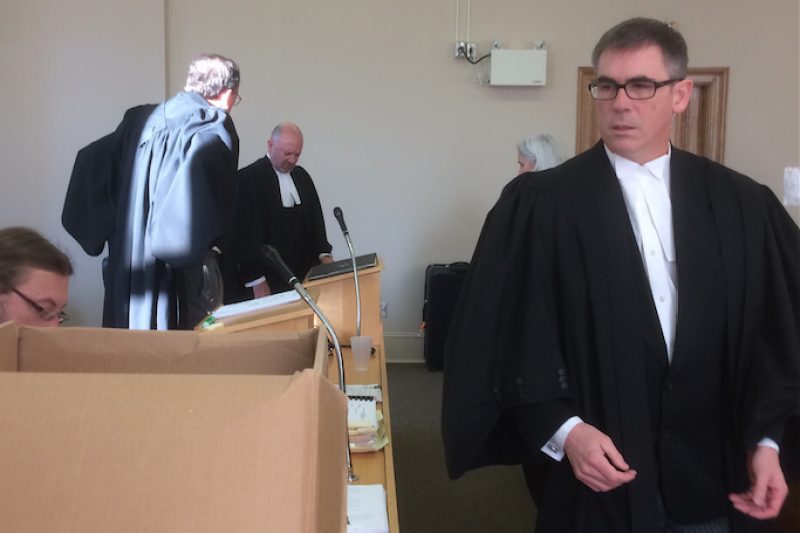Closing Arguments Begin in Mount Cashel Civil Trial
By Barb Sweet
On the Supreme Court of Newfoundland and Labrador steps, a John Doe former Mount Cashel resident now in his 70s held out hope for atonement from the Roman Catholic Church that he is convinced could have helped boys abused long ago at the infamous orphanage. “How could you hurt a child?” asked the man, who detailed at the Mount Cashel civil trial earlier this year the horrific childhood physical and sexual abuse he said he suffered at the hands of Irish Christian Brothers in the 1950s. Church officials and priests are not implicated in any of the abuse allegations connected to the case, but he is convinced the church had a role in the operations of the Christian Brothers’ orphanage and could have intervened. In his mind, the answer is one of clear responsibility. But the question of liability before Justice Alphonsus Faour is infinitely more complex and tied up in a long and winding history of the archdiocese — involved in the case through the Episcopal Corp. of St. John’s — and the lay order Christian Brothers, as well as legal precedent. John Doe is one of four test case John Does represented by the St. John’s law firm Budden and Associates, and he was in the courtroom Wednesday as closing arguments began 5 ? months after witness testimony concluded. He said he put the trial out of his mind during those months, but felt good about how his lawyers’ closing arguments are going so far. The four test-case John Does say the church, through the Episcopal Corp., should be held liable for physical and sexual abuse they suffered at the hands of certain members of the lay order of Irish Christian Brothers. The Does — all orphanage residents several decades ago — represent about 60 clients who were at the orphanage during the late 1940s to early ’60s. The church insists the lay order Irish Christian Brothers ran the orphanage and were independent of the archdiocese. Will Hiscock told the court Wednesday the orphanage boys were the most vulnerable youth in Newfoundland and were failed time after time when they confided in certain priests about being abused. Geoff Budden laid out his case for liability — noting trial evidence that suggested certain priests were told in and out of confession what was going on by boys reporting abuse. He noted the archdiocese was also put on notice by an employee who reported assaults on boys by a fellow orphanage employee. Budden asserted that given the alerts to the archdiocese of abuse at the orphanage, there was no evidence that — despite opposing assertions the Christian Brothers had to follow their own hierarchy — anything was ever said to the organization’s overseers in New York, or to the Vatican, and there is no evidence there was any positive change at the orphanage to indicate anything was done about the abuse. He said the idea of the confessional being sacred was discounted by an option put forward in canonical law testimony that the priest hearing a boy’s confession of being sexually abused could have asked the boy to repeat it outside the confessional. Instead, Budden said the boys reporting the abuse were given penance and nothing was done to end the abuse. “It continued and continued and continued,” Budden said. Budden told the court the archdiocese enhanced the Brothers’ reputation in the community and the great irony is that, other than the boys, it was the archdiocese that knew the Christian Brothers’ reputation was anything but sterling. Budden said evidence suggests the archdiocese had power and the Brothers did not. Besides some letters regarding fundraising requests from the 1950s handled by the archdiocese, Budden brought up a Smallwood-era year-long dialogue between the archbishop of the day and a cabinet minister regarding “high-level” child welfare issues that left the orphanage’s Brother Superior out of the loop in that process. Budden contends the church knew or ought to have known what was going on at the orphanage. He said while it’s been argued that attitudes have changed regarding physical abuse, sexual abuse being seen as evil is eternal. The trial, during many of its 31 non-consecutive days this year, contained disturbing testimony concerning the experiences of the four John Does at the orphanage several decades ago, as well as personal details of their lives since then and various expert opinions on child sex abuse and its impacts. Testimony in the Mount Cashel civil trial ended June 30. Four John Does testified, as well as a former resident not involved in the case. Three agreed statements of fact were also entered concerning the experiences of three other former Mount Cashel boys. Among the others the court heard from were two canon lawyers, the archbishop, a historian, a sister of one of the John Does, three psychologists, a psychiatrist and an economist. The Roman Catholic Episcopal Corp. of St. John’s is represented by the Toronto law firm Miller Thomson, whose lawyers will begin their closing arguments sometime Thursday. bsweet@thetelegram.com
|
.
Any original material on these pages is copyright © BishopAccountability.org 2004. Reproduce freely with attribution.
